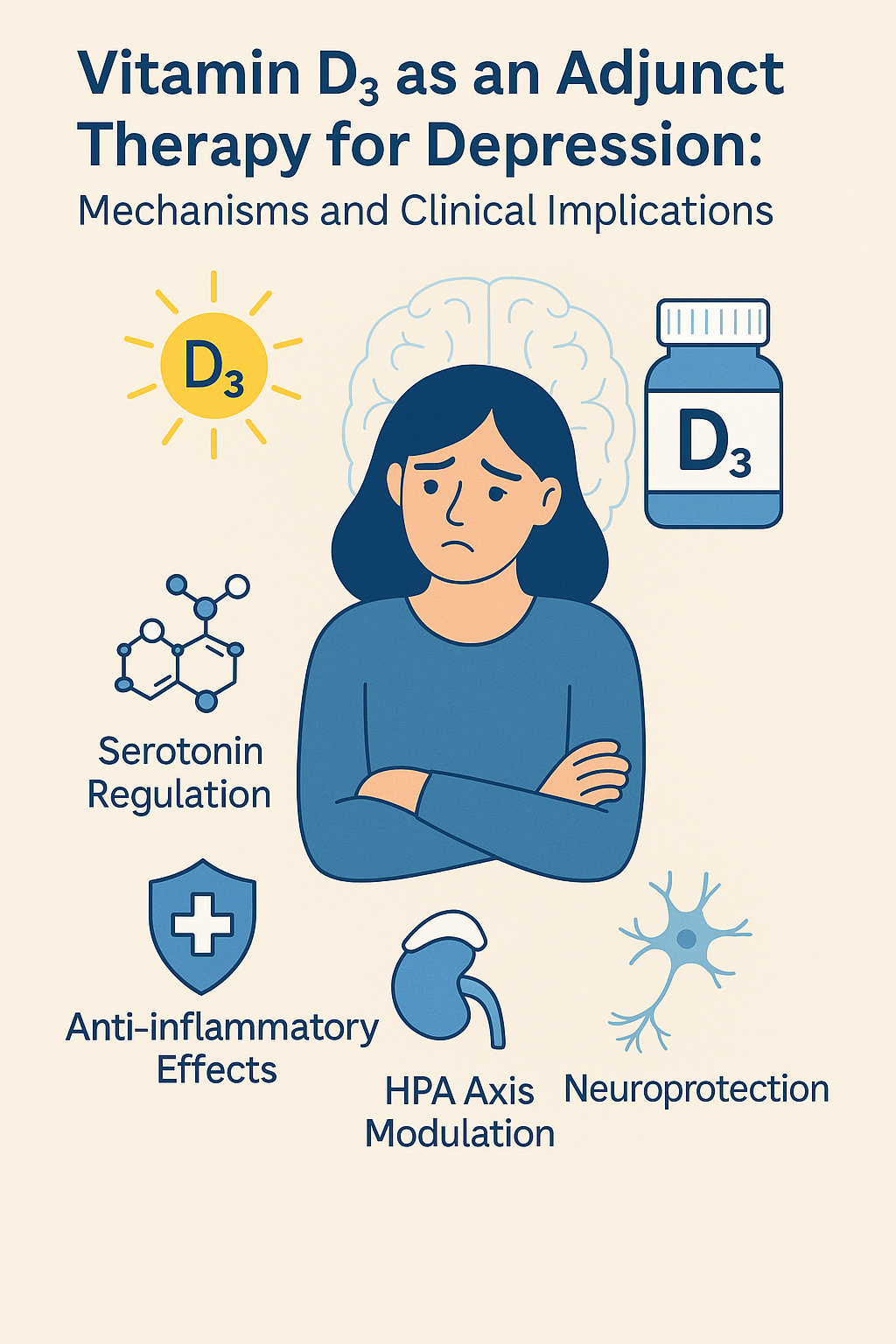
Vitamin D₃ as an Adjunct Therapy for Depression: Mechanisms and Clinical Implications
? Introduction
Depression is one of the most common mental health disorders worldwide,
affecting over 280 million people. While conventional treatments such as
antidepressants and psychotherapy are effective, many patients do not achieve
full remission. In recent years, researchers have turned their attention to nutritional
factors, particularly Vitamin D₃, as potential adjunct therapies to
enhance mental health outcomes.
☀️ What is Vitamin D₃
and Why Does it Matter?
Vitamin D₃ (cholecalciferol) is a fat-soluble vitamin that plays a
critical role in bone health, immune function, and inflammation control. But
beyond these well-known roles, Vitamin D₃ also affects brain function.
It is produced in the skin in response to sunlight and is also available
through diet and supplements.
Brain tissues have vitamin D receptors, and enzymes necessary for
its activation are present in the central nervous system—especially in areas
associated with mood regulation.
? How Does Vitamin D₃
Influence Mood and Depression?
Several biological mechanisms explain how Vitamin D₃ may support mental
well-being:
- Serotonin Regulation
Vitamin D₃ helps regulate the synthesis of serotonin, a neurotransmitter strongly linked with mood, emotion, and sleep. - Anti-inflammatory Effects
Chronic inflammation is often linked to depression. Vitamin D₃ has natural anti-inflammatory properties that may help reduce this risk. - HPA Axis Modulation
It may help stabilize the hypothalamic-pituitary-adrenal (HPA) axis, which regulates stress hormones like cortisol. - Neuroprotection
Vitamin D₃ protects brain cells from oxidative stress and supports the growth of new neural connections.
? What Do Clinical
Studies Show?
- Supplementation Trials: Several randomized controlled
trials have found that vitamin D₃ supplementation improves depressive
symptoms, especially in individuals with low baseline levels.
- Combination Therapy: When used alongside
antidepressants, vitamin D₃ has shown to enhance treatment response in
some patients.
- Dosing: Benefits are most often
observed in individuals who were deficient before supplementation.
However, the evidence is still mixed, and more large-scale,
high-quality trials are needed.
?⚕️ Who Might Benefit
Most?
- Individuals with chronic
vitamin D₃ deficiency
- People living in low-sunlight
regions
- Pregnant or postpartum women
- Elderly individuals
- People with coexisting chronic
illnesses
? Implications for
Mental Health Care
Healthcare providers are encouraged to:
- Screen for vitamin D₃ deficiency in patients with depression
- Educate patients about safe
sun exposure, dietary sources, and supplements
- Consider vitamin D₃ as a
complementary approach, not a replacement for psychiatric care
✅ Conclusion
Vitamin D₃ shows promise as a supportive treatment for depression due to
its effects on brain health, mood regulation, and inflammation control. While
it is not a standalone cure, supplementing with vitamin D₃ may improve
treatment outcomes—especially in those who are deficient. As the field of
nutritional psychiatry continues to grow, Vitamin D₃ represents a simple, safe,
and cost-effective addition to comprehensive mental health care.
 Sign In With Google
Sign In With Google
Leave A Comment